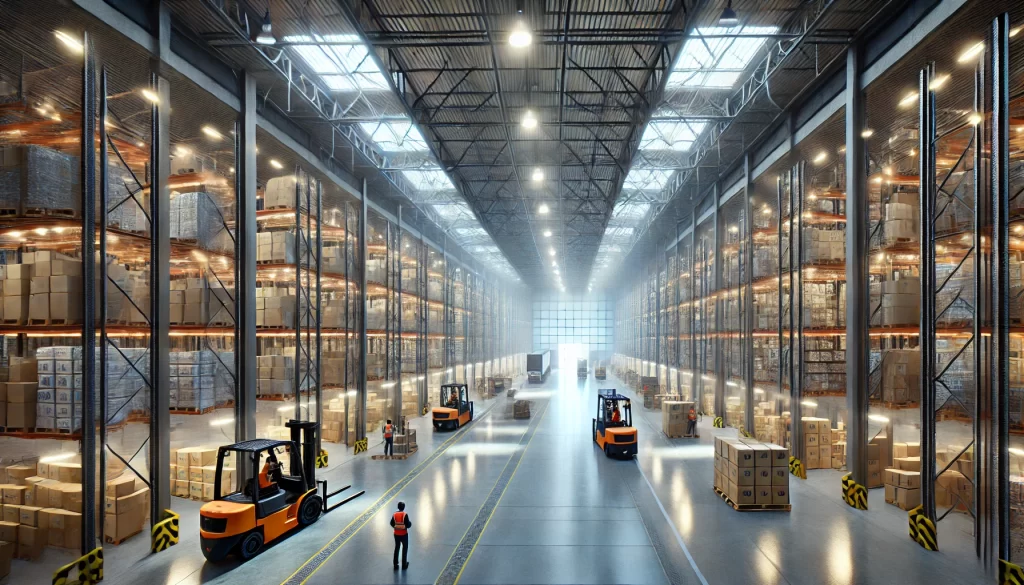What is a 3PL Company?
Simply put, a 3PL company manages logistics operations for other businesses, taking care of everything from warehousing and transportation to inventory management and order fulfillment. Imagine you run an online store. By partnering with a 3PL company, you can focus on business growth while the 3PL handles logistics. These companies use advanced technology and a network of transportation options to ensure products move efficiently from the warehouse to the customer’s doorstep. This partnership can save time, reduce costs, and improve overall efficiency.
How Do 3PL Companies Make Their Profit?
3PL companies make their profit by charging fees for their services, which can include storage fees, transportation costs, and handling charges. They also leverage economies of scale, optimizing routes and consolidating shipments to reduce costs and increase margins. Additionally, by offering value-added services such as packaging, labeling, and reverse logistics, they create multiple revenue streams.
Types of 3PL Providers
There are two main types of 3PL providers: those that use the customer’s building and equipment, and those that use their own. Let’s break down these types further.
Customer-based 3PL
These providers operate within the client’s facilities and use the client’s equipment. This approach allows for greater customization and integration with the client’s existing processes, making it ideal for businesses with unique or complex logistics needs. Think about a specialized company that has specific handling requirements for their products. By using the customer’s infrastructure, a 3PL can tailor their services to fit those precise needs.
Asset-based 3PL
These providers use their own buildings, warehouses, and equipment. They typically offer a more standardized service and can achieve greater economies of scale. This type is beneficial for companies looking to outsource logistics entirely and leverage the 3PL’s established infrastructure and expertise. For example, a growing e-commerce business might prefer this type of 3PL to handle their logistics seamlessly without the need to invest in their own warehousing or transportation resources.
The Hybrid Model
Additionally, some 3PL companies operate under a hybrid model, partially using customer-based facilities and partially relying on their own warehouses and equipment. This approach offers flexibility, allowing the 3PL to tailor their services to the specific needs of each client while still benefiting from their own infrastructure and resources. It’s like getting the best of both worlds – customization where needed and efficiency where possible.
Why Big Companies Use 3PL Services
Big companies, such as Google, use 3PL services to streamline their supply chain operations and focus on their core competencies. By outsourcing logistics to specialized 3PL providers, these companies can benefit from improved efficiency, reduced operational costs, and access to advanced logistics technology. This allows them to scale their operations more effectively, enhance customer satisfaction, and stay competitive in their respective markets.
The Role of Technology in 3PL
Advanced technology plays a crucial role in 3PL operations. From warehouse management systems (WMS) to transportation management systems (TMS), these technologies help 3PL companies optimize their processes. For instance, a WMS can improve inventory accuracy and reduce picking errors, while a TMS can optimize delivery routes to save on transportation costs. By leveraging these technologies, 3PL providers can offer more reliable and cost-effective services.
Benefits of Using a 3PL
Using a 3PL has several benefits for businesses of all sizes. Here are a few key advantages:
- Cost Savings: By outsourcing logistics, businesses can avoid the high costs associated with maintaining their own warehouses and transportation fleets.
- Scalability: 3PL providers can easily scale their services to match the growth of a business, allowing for flexible expansion without the need for significant upfront investment.
- Focus on Core Competencies: By letting the 3PL handle logistics, businesses can focus on their core competencies and strategic initiatives.
- Improved Customer Service: 3PL providers often have advanced tracking and reporting capabilities, which can improve the overall customer experience by providing accurate and timely delivery information.
- Access to Expertise: 3PL companies have specialized knowledge and expertise in logistics, which can help businesses navigate complex supply chain challenges more effectively.
Challenges of Using a 3PL
While there are many benefits to using a 3PL, there are also some challenges to consider:
- Loss of Control: When outsourcing logistics, businesses may feel they have less control over their supply chain operations.
- Dependence on 3PL: Relying heavily on a 3PL can make a business vulnerable if the 3PL experiences issues such as financial instability or service disruptions.
- Integration Issues: Integrating a 3PL’s systems and processes with a business’s existing operations can be complex and time-consuming.
Should You Work for a 3PL Company?
Now that we’ve covered what a 3PL company is and how it operates, let’s explore whether working for one could be the right career move for you.
The Pros of Working for a 3PL Company
- Diverse Opportunities: 3PL companies offer a wide range of roles, from warehouse operations and transportation management to customer service and IT. This diversity can provide a variety of career paths and growth opportunities.
- Industry Growth: The logistics industry is growing rapidly, driven by the rise of e-commerce and global trade. Working for a 3PL company can provide job stability and opportunities for advancement in a thriving sector.
- Technological Innovation: 3PL companies are often at the forefront of logistics technology, utilizing advanced systems to optimize operations. If you’re interested in tech and innovation, a career in 3PL can be exciting and rewarding.
- Skill Development: Working in logistics can help you develop valuable skills in areas such as supply chain management, problem-solving, and process optimization. These skills are highly transferable and can open doors to various career opportunities.
The Cons of Working for a 3PL Company
- High Pressure: The logistics industry can be fast-paced and high-pressure, particularly during peak times such as holiday seasons. This environment might not be suitable for everyone.
- Operational Challenges: Working for a 3PL company often involves dealing with operational challenges, such as managing inventory, coordinating transportation, and meeting delivery deadlines. These challenges can be stressful and demanding.
- Job Stability: While the logistics industry is generally stable, individual 3PL companies can be affected by economic fluctuations, changes in client contracts, and other factors. Job stability can vary depending on the specific company and market conditions.
Is It the Right Fit for You?
If you’re fresh out of college and want to gain experience in logistics and supply chains, working for a 3PL company might be a good option for the early stages of your career. However, be prepared for a high-pressure and intense environment. 3PL companies often operate with just enough headcount, which means you might be very busy. On the other hand, you could be lucky enough to have a customer who is generous and funds several positions to boost efficiency, making your workload more manageable. It’s important not to rely solely on this possibility—do your research beforehand. The industry offers diverse opportunities, potential for growth, and the chance to work with cutting-edge technology.
However, if you prefer a more predictable and low-pressure work environment, you might want to consider other career options. The stability of a 3PL company is closely tied to market conditions. If the market is saturated with a customer’s product, there’s a significant impact on sales, or a recession occurs, you might lose your job. It’s very unpredictable. Therefore, I would not recommend anyone with ample experience in logistics to work in a 3PL company unless they are in upper management, where the impact of losing a customer account would be less significant. It is essential to weigh the pros and cons and consider how they align with your career aspirations and lifestyle.
Conclusion
Understanding the operations of a 3PL company can be complex, but it’s clear that these providers play a crucial role in modern supply chain management. By handling logistics operations, 3PL companies allow businesses to focus on growth and strategic initiatives. Whether using customer-based facilities, their own assets, or a hybrid model, 3PL providers offer a range of services that can significantly enhance a company’s logistics capabilities.
For those considering a career in the logistics industry, working for a 3PL company can provide diverse opportunities, the chance to work with advanced technology, and the potential for career growth in a rapidly expanding sector. However, it’s important to consider the high-pressure nature of the work and the operational challenges that come with it.
By partnering with a 3PL, businesses can achieve cost savings, scalability, improved customer service, and access to specialized expertise. For employees, it offers a dynamic and rewarding career path in an essential and ever-evolving industry.
As we explore the world of logistics, it’s evident that 3PL companies are indispensable partners for businesses looking to optimize their supply chains and stay competitive in today’s fast-paced market. Whether a business owner considering outsourcing logistics or a professional exploring career opportunity, understanding the role and benefits of 3PL companies is crucial in making informed decisions.


